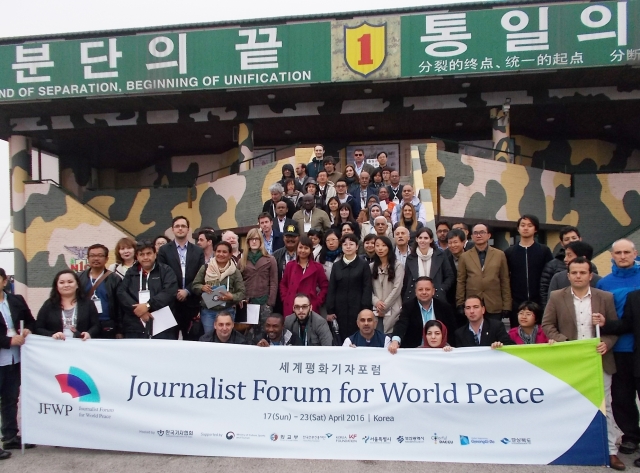Excerpt: What Can Georgia Learn from Korea in Terms of Conflict Management?
A massive media conference, titled ‘Journalists for World Peace,’ was recently organized by the Journalists Association of Korea (JAK). I was lucky enough to be invited (not without considerable support from the Embassy of Korea here in Georgia). 80 delegates from 50 countries, many of them from volatile regions, visited, tested and tasted the best South Korea had to offer – from thoughtful chats with high profile government officials in Seoul and Busan, to the high-tech confines of the Samsung Gallery, all crowned with a tour to the famed Demilitarized Zone between the North and South. True to the conference agenda, we, journalists and media representatives from all around the world, joined our voices and signatures, passing a resolution calling for world peace and denuclearization of the Korean Peninsula.
As I was preparing to embark on what ultimately proved to be a quite perilous, if interesting, journey to South Korea, I was expecting a country that in many ways was supposed to be a complete opposite of my own, or rather a tale of what Georgia should have (or could yet) become, if the right decisions were made by the right people up top. To say I was wrong would be an understatement. While there are enough similarities between the two countries for a comparative analysis in the skillful hands and mind of an able political scientist, the ethno-cultural and, most of all, mentality differences render any possibility of creating a Korean model for Georgia a limited undertaking. In simpler words, we’re just too different. A nagging doubt tells me that this was exactly the case with the Singapore model that was so relentlessly pitched to Georgian people by the previous government, but this is another story. However, accepting differences, or rather, diversity, is what makes the modern world tick and there are undoubtedly some lessons Georgia could learn from Korea. One field especially ripe in such lessons is that of conflict management. So here are 5 lessons that Georgia would do well to take from the standoff that has been taking place in the Korean Peninsula for more than 50 years now:
1. It Takes Two to Tango, Especially in DMZ
“Korea remains the world’s only divided country” – was the line uttered in solemn tones by almost every Korean official we’ve met. While that’s a disputable notion (Cyprus comes to mind as the easiest example), it is true that unlike in many scenarios of interstate conflicts, where different ethnic groups are facing off, here we are dealing with two parts of the nation – and while one of them is more or less inclined to reconciliation (more on this below), the other has entrenched in its isolation as an only means of survival. The lesson here is that while you can impose “reconciliation”, just encouraging it is not enough unless both sides are willing to commit. Proof of this is the South Korean experiments turning the DMZ into a ground where the two groups would have a common foothold, hailed as a hugely important milestone in the peace process – while South Korea pushed for the creation of Kaesong Industrial Region, where thousands of North Koreans found employment, Pyongyang wasted no time in digging incursion tunnels beneath the demilitarized zone. Seeing its efforts going to waste amid yet another North Korean attempt to test nuclear missiles, Seoul authorities have ordered it to be “temporarily” closed down, recalling all staff and shutting down all activities in the process. Today, the demilitarized zone just lies there as a de facto border and a buffer territory, not a place for building peace and reconciliation.
For the full version of this article, please go to GeorgiaToday.ge
Vazha Tavberidze












